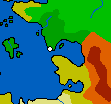The Mérovecnate of Vespaseilles
Government: Aristocratic Republic
Ruler: Mérovec (Merh-oh-veyc) Nazaire I
Capital City: Vespaseilles (Vey-pah-say), on the island of Provance (Pro-vanc)
Religion: Eglise De Le Soleil (Church of the Sun) (Simple English Plural form: Eglisians)
Economy: Okay
Income: +1 (100% Land Taxes)
Men Available: 5,000
Army: 4 Merguerrier (lit. - seawarriors) Compagions, 6 Chasseur Compagions (light skirmishers/archers) (200 Men Each)
Navy: 20 Vespasillian Galéres (Gal-E-rs)
Culture: 1
Infrastructure:
Approval Rating: 50%
Resources: None
Major Wonders:
Short Background: Descendents of avernic fisherman which ploughed the sea of provance since early neolithic times. Since such times, the fisherman have consolidated into a single nation, a single city-state known as Vespasilles, under a single government known as the Vespasillian Mérovecnate. It is here that they have forged a culture similar yet ultimately unique to what is present on the mainland.
START LOCATION: I'd ask for this purplish-grey color aswell.
A Basic Overview of La Grandé Merovecnate.
[Note - I am using the French language as a language for my nation, if for no other reason than I am currently studying it and I like the sound. It also fits nicely with my history, as the Vespasillians were originally mainlanders]
The Vespasillian people have their origins in the region of Avernia as simple coastal folk. Religious scripture of the Eglises tell of a 'divine inspiration' which led the Vespasillian people onto the isle of Provance (Pro-vanc) (translates into simply province, or in an antiquated meaning, home) yet what is most widely accepted is that in the times before the tribes of Avernia began to join closer together and confederate into what is now Avernum, the tribes of the coastal areas took to the blue waters of the Provanc seas in simple reed fishing boats, eventually reaching Provance. An early fishing settlement was established in the area modern day Vespasilles during the neolithic eras, a fishing settlement which slowly grew into a small city as time drew closer to the era of the first civilizations.
The city name of Vespasilles is derived from the name of a prominent fishing tribe, people known as the Vespasiens. The city lies between where the Soleil river meets the Mer D'Azure (Azure Sea) (commonly refered to by most Vespasillians as the Provance Sea). There is fertile land, yet not in great enough quantities. Therefore the mainstay of the Vespasillian diet has been and remains thusfar fish, backed up by grains, grapes, olives, and other vineyard fruits which are growth throughout the isle.
The system of government is decidedly similar to the governments around it, in that it is based on a republican system of shared government. However as with most republics it is decidedly not free, no matter what rhetoric tells you. Rather, it is a republic centered upon the few wealthy elite
Comtes (Counts) of the nation. Most Comtes are wealthy merchants (trading, along with fishing, being the major industry of Vespaseilles now) who have accumulated their power with their wealth. Over the comtes and over the whole of the Merovecnate rules the Mérovec. Essentially, he is the king (and has king-like powers) of the republic, appointed for life by a council of the Comtes. Yet even though confered massive powers, he does not rule absolute. Instead, annually he calls upon a congregation of the nobility, where they will confer to him suggestions and requests concerning the government. The comtes, being the major holders of wealth in the Mérovecnate, hold significant influence in the economy of the nation aswell. Naturally however, the Merovéc governs the Mérovecnate.
Another important, yet not central, fixture of Vespaseilles is the Eglise de Soleil, or church of the Sun. As can be assumed, worship is mainly given to the sun, which Vespasillians belive the earth originated from, as a child of the aforementioned celestial body. The sun is also worshiped as the center of all life, and if not pleased, will cease to burn. Offerings of animals and food are normally given. The church, the organ of religion, is meticulously organized under its own seperate 'government' aswell. Ruling the church is the
Ponté, whom is appointed by the Merovéc. It is the Ponté's duty that religion is properly administered and that the sun is given the proper offerings, to ensure the prosperity of the Mérovecnate.
Last but not least, is the military. The military, because Vespaseille is essentially surrounded by water, is focued upon maritime capability. On land the bulk of its forces remain lightly armored skirmishers and archers known as the
Chasseurs while an elite force of marines known as Merguerriers is maintained for action with the fleet. Merguerriers are primarily armed with short swords and moderately sized oval shields. They are given a secondary weapon known as the
javelot, a thin, sharp metal spear with a wooden shaft meant for ranged combat. Meanwhile the navy is composed exclusively of Vespasillian Galéres - fast, moderately sized oared galleys.
---
Spear Armed Merguerrier
Chasseur Infanterié - Light Skirmisher infantry
Chasseur Archer - Archers










 It's now the Kingdom of the Sky
It's now the Kingdom of the Sky